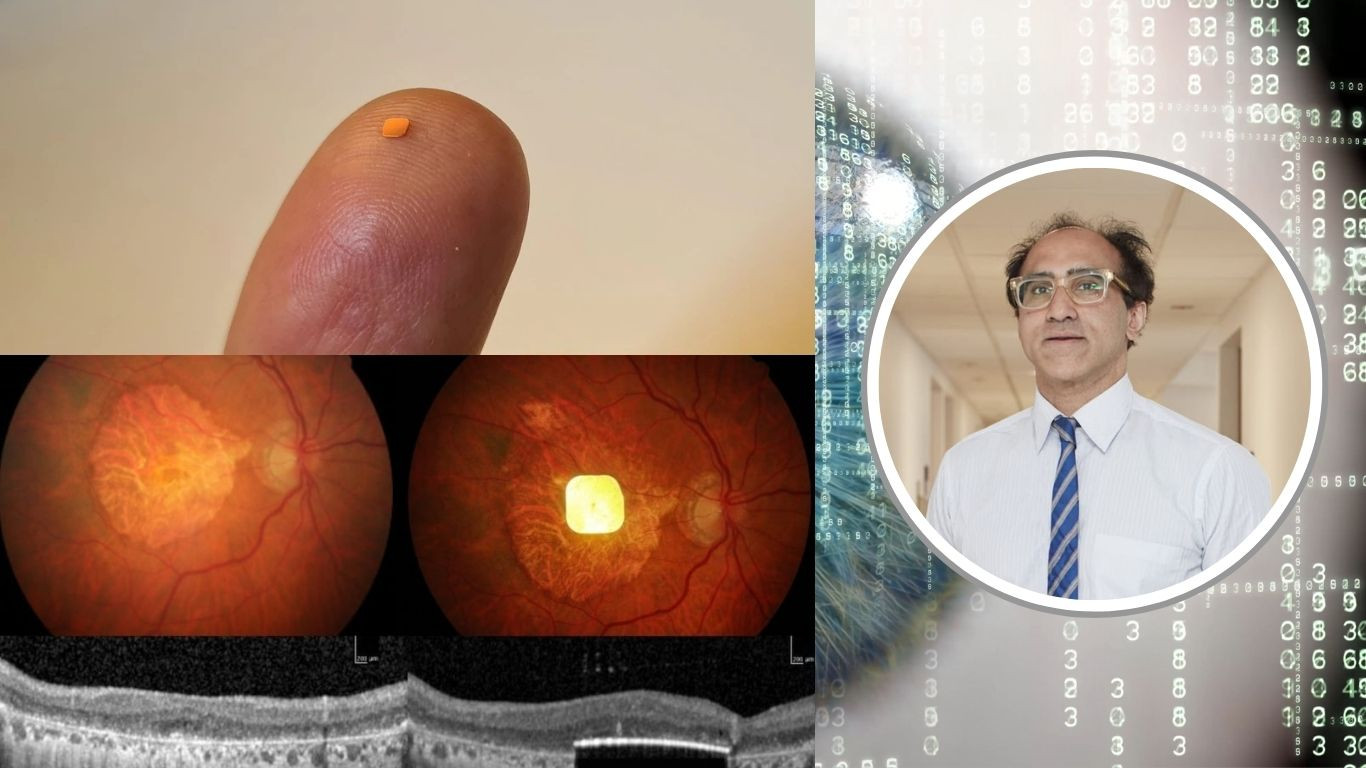Restoring Vision with a Bionic Chip
How a British-Bangladeshi surgeon is helping the blind see again
A groundbreaking medical breakthrough is helping restore vision
Suman Saha, Dhaka
Published: 26 Oct 2025

Millions around the world lose their sight to age-related eye diseases. They can no longer read a book or recognise the faces they love. Gradually, their world fades into darkness.
Now, that darkness has a chance to lift.
A groundbreaking medical breakthrough is helping restore vision. A tiny bionic chip is allowing blind people to see again.
At the heart of this remarkable innovation stands a proud British-Bangladeshi name: Dr Mahiul Muhammed Khan Muqit.
Dr Muqit is a senior eye surgeon at Moorfields Eye Hospital in London – one of the world’s leading centres for eye care – and an Associate Professor at University College London.
Working alongside renowned experts in Paris and Stanford, he helped pioneer a surgical technique to implant a 2mm-by-2mm wireless microchip beneath the retina. The chip connects with special glasses fitted with a mini video camera.
“This small device is creating a big paradigm shift in treating blindness,” Dr Muqit told the Daily Sun in an interview. “Patients with age-related macular degeneration (AMD) are regaining vision. "Over 80% of legally blind trial participants have shown major improvement – they can read letters, numbers and words, recognise shapes, and even some able to write again.”
His contributions were recently highlighted in The New England Journal of Medicine, where he co-authored a landmark study on retinal implant technology that restores functional vision in patients suffering from AMD, a leading cause of blindness affecting over five million people worldwide.
The study demonstrated that the PRIMA implant can effectively restore central vision in patients with geographic atrophy (GA), a severe form of AMD.
The device records images through a video camera, processes them using AI algorithms, and transmits infrared signals to the retinal implant.
The implant then stimulates the undamaged neurons in the inner retina, which relay the signals through the optic nerve to the brain, where they are interpreted as vision.
How bionic vision works
In a healthy eye, light-sensitive cells in the retina convert light into electrical signals that travel to the brain via the optic nerve.
AMD destroys these photoreceptor cells, leaving a black circular blind spot in the center of vision. While peripheral sight remains, patients lose the ability to read, drive, or recognise faces.
The new implant bypasses the damaged cells altogether. Acting as a micro-array of electronic photoreceptors, it replaces natural light sensors with artificial ones.
A camera on the special glasses captures the world in front of the patient, while AI software in a pocket processor converts the images into infrared signals. The implant then stimulates healthy retinal neurons, and the brain interprets these as visual images.
The system functions almost instantaneously once the glasses are worn, effectively creating a digital bridge between light and sight. Patients can even “zoom” in on letters or objects to enhance clarity. After activation, they undergo several months of visual training to retrain their brains to see again.
Rooted in Bangladesh
Dr Mahi Muqit is originally from Baniachong in Sylhet.
His parents, Dr. Abdul Muqit and Dr. Mamtaz Begum, are both graduates of Dhaka Medical College. Over the past 30 years, he has returned to Bangladesh almost every other year, nurturing a lifelong connection with his ancestral home.
His expertise brought him back at a critical moment. Responding to an invitation from Bangladesh’s interim government, Dr Muqit and his colleague Dr Niaz Islam travelled to Dhaka to treat 120 patients with bullet-related eye injuries at the National Institute of Ophthalmology, 24 of whom underwent complex, sight-saving retinal surgeries. These patients were among those injured during the July 2024 mass uprising.
For the past 17 years, he has collaborated with Helen Keller International in Bangladesh, helping establish diabetic retinopathy screening programmes that have prevented blindness across vast regions of the country.
He also serves as a Visiting Professor at the Lions Eye Institute and Health in Chattogram, supporting local doctors in developing innovative diabetic eye screening systems.
The desire to read a page, recognise a loved one’s face, or simply see the world clearly is profoundly human. Dr Muqit’s work does more than restore sight – it restores independence, confidence, and human connection.
“Every letter a patient reads is a reminder of why innovation matters,” he says, underscoring the power of science to transform everyday life.
For countless blind patients, what once seemed impossible is now a reality to see again.
The reporter can be reached at: [email protected]
Edited by: Anayetur Rahaman

